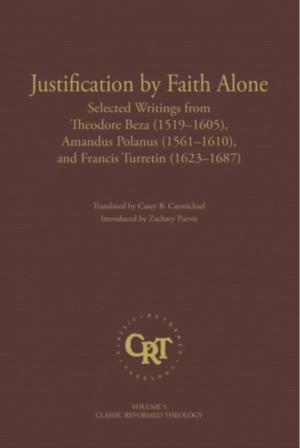Salvation by Allegiance Alone: Rethinking Faith, Works, and the Gospel of Jesus the King, took me back 20 years to my seminary days.1 Back then the New Perspective on Paul was tearing up the scene in biblical studies and the Federal Vision . . . Continue reading →
Sola Fide
“Edwards Injects Into Faith” In The Act Of Justification The Virtues Of The Christian Life
Edwards is very clear that faith does not justify a believer as a virtue or as forming any part of the righteousness which is the basis or ground of God’s judicial verdict. In this, he clearly stands with the Reformed tradition over . . . Continue reading →
Vos: All Our Works Are Excluded From Justification
Not only the works that we do in our own strength, or that we do before regeneration, or that we do without the merits of Christ, but all works, of whatever sort, are excluded from justification. This is so repetitively certain Scripture . . . Continue reading →
A. A. Hodge: Contra Rome: The Protestants Say That Love Is The Fruit Of Faith
What are the different opinions as to the relation between faith and love? 1st. The Romanists, in order to maintain their doctrine that faith alone is not saving, distinguish between a formed, or perfect, and an unformed faith. They acknowledge that faith . . . Continue reading →
Warfield On Faith Contra The Edwardsian Definition
Kim Riddlebarger, who did his doctoral research on Warfield, has a nice set of quotations from him on the nature, character, and definition of faith in the act of justification. Continue reading
Faith Formed By Love Or Faith Alone? The Instrument Of Justification
In his discussion of works, Calvin anticipates the great error of many contemporary critics of the Reformation doctrine. They think that as long as they say that salvation is by grace alone they have said all they need to say theologically, but many medieval theologians said exactly that. They taught that grace alone worked to transform and sanctify the life and that all the works of the Christian are the fruit of grace. Such an improved life, however, is still an imperfect life and cannot stand in the judgment. Calvin summarizes the situation succinctly: “If righteousness is revealed in the gospel, surely no mutilated or half righteousness but a full and perfect righteousness is contained there. The law therefore has no place in it” (Institutes 3.11.19). What one needs to stand in the judgment, Calvin declares over and over again, is a perfect righteousness. No matter how much progress one makes in grace during this life, so that one’s life becomes holier, holier, and holier, it will never get to the point where it will be able to stand in the judgment. Continue reading →
Ursinus: True Faith, In The Act Of Justification, Is Not Formed By Affections Or Love
Ursinus Was Not Edwards
Justifying faith is properly that which is defined in the catechism; according to which definition, the general nature of saving faith consists in knowledge and an assured confidence; for there can be no faith in a doctrine that is wholly unknown. It . . . Continue reading →
Piper’s New Book Is Edwardsian
The major—and expected—exception is Jonathan Edwards, whose view of faith no doubt stands behind Piper’s approach to this issue. Edwards believed that love is at the heart of faith: “That even faith, or a steadfastly believing the truth, arises from a principle . . . Continue reading →
Coming In December, 2022: Beza, Polanus, And Turretin On Justification
From its inception, the goal of the Classic Reformed Theology Series from Reformation Heritage Books (sponsor of the Heidelcast) has been to present, in English, primary source texts in Reformed theology. This new volume is the sixth in the series, which began . . . Continue reading →
Trent’s Knowing And Intentional Rejection Of Justification Sola Fide
After theologians the bishops took the floor, song speaking for two or more hours at a time. Some were well-versed in the subject. Their approach, like that of theologians, was generally framed by Scholastic categories, and, despite Pole’s words, they often seemed . . . Continue reading →
On Justification In Romans And Hebrews
One does not often think of Hebrews when it comes to the doctrine of justification—we normally go right to Paul’s writings. Continue reading
Romans 5:9–10: You Were Justified And You Shall Be Saved Sola Gratia, Sola Fide
For many evangelicals and for some ostensibly Reformed folk it has been fashionable for the last several years to teach that we are justified now by grace alone (sola gratia), through faith alone (sola fide), on the basis of Christ’s righteousness imputed . . . Continue reading →
Perkins: As Soon As One Believes
For so soon as a man believes, he is presently justified. For every believer has… Continue reading →
Perkins On “The Exclusive Particle”
Throughout his works Perkins objected to the idea that one was justified by a mixed faith. On the contrary, faith was to be regarded as an instrument “to apprehend and apply that which justifies, namely, Christ and His obedience.” Perkins saw justifying . . . Continue reading →
A Timely Reminder: James 2:24 Does Not Teach Justification Before God By Works
“You see that a person is justified by works and not by faith alone.”— James 2:24 It’s not uncommon to hear some people appeal to James 2:24 in order to argue that God saves people by faith plus works. In particular, some . . . Continue reading →
Owen: The Loss Of Justification Sola Fide Leads To Rome Or Atheism
I shall take the boldness, therefore, to say, whoever be offended by it, that if we lose the ancient doctrine of justification
Heidelcast 205—What Must A Christian Believe? (21): The Forgiveness Of Sins (3)
This is episode 21 in the series, What Must A Christian Believe? In our survey of the rule of faith, i.e., the Apostles’ Creed, we are completing our brief study of the tenth article, “the forgiveness of sins.” The doctrine of justification . . . Continue reading →
Heidelcast 204—What Must A Christian Believe? (20): The Forgiveness Of Sins (2)
This is episode 20 in the series, What Must A Christian Believe? In our survey of the rule of faith, i.e., the Apostles’ Creed, we have reached the tenth article, “the forgiveness of sins.” The truth of our righteousness with God is essential . . . Continue reading →
Heidelcast 202—What Must A Christian Believe? (19): The Forgiveness Of Sins (1)
This is episode 19 in the series, What Must A Christian Believe? In our survey of the rule of faith, i.e., the Apostles’ Creed, we have reached the tenth article, “the forgiveness of sins.” That phrase does not occur in the earliest . . . Continue reading →
Heidelcast 194: What Must A Christian Believe? (11) On Christ’s Obedience And Atoning Death
In our survey of the rule of faith, i.e., the Apostles’ Creed, we have reached the fourth article: “suffered under Pontius, Pilate, crucified, dead, and buried. He descended into hell.” In this episode we consider Christ’s suffering and death and in the . . . Continue reading →




